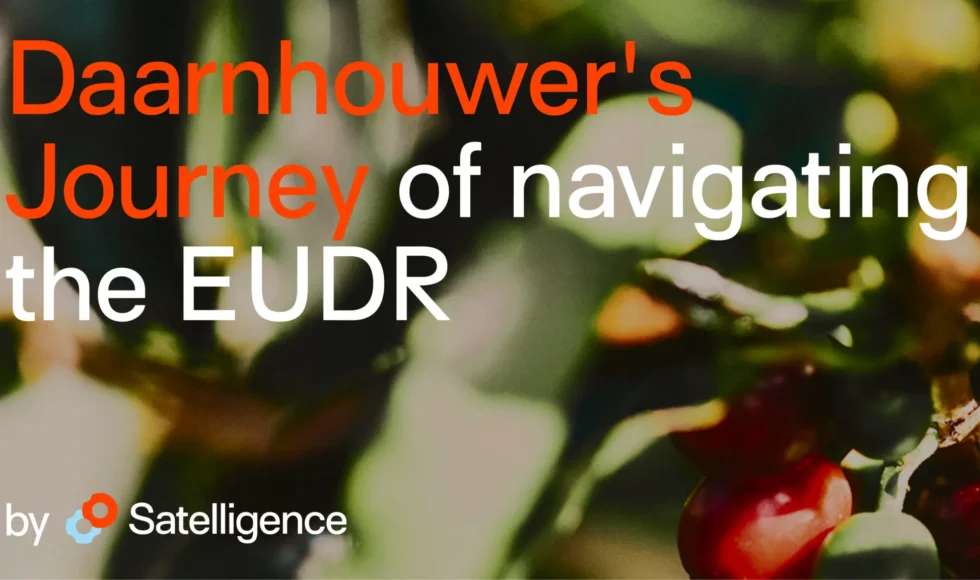As global markets increasingly prioritise sustainability, regulations like the European Union Deforestation Regulation (EUDR) are changing how companies source their products. These rules aim to stop deforestation by ensuring that agricultural products entering the EU aren’t linked to illegal land use. While this is a positive step for the environment, it poses unique challenges for smaller businesses like Daarnhouwer, which rely on complex and diverse supply chains in the coffee and cocoa industries.
Through our partnership with Daarnhouwer, we’ve seen firsthand the challenges they face—and the potential of data-driven solutions to transform their processes. With the help of Satelligence’s Sustainable Sourcing platform, Daarnhouwer now has a clear overview of which plots comply with the EUDR and where potential issues lie. This allows them to focus their efforts on ensuring compliance where it’s needed most, while also providing a tool to verify field data and improve transparency across their supply chain
Recently, our Customer Success Manager, Ingrid Beuzekom, sat down with Daarnhouwer’s leadership to explore their experience navigating the EUDR and how these tools are helping them meet the new regulations.
The impact of EUDR on medium-sized businesses
The EUDR marks a major shift in how businesses manage their supply chains. While larger companies with more resources can adjust more easily, medium-sized businesses like Daarnhouwer, which sources from smallholder farmers across many countries, face much higher stakes.
The regulation requires companies to prove their products haven’t contributed to deforestation. This means gathering accurate data and going through strict verification processes. For Daarnhouwer, this has meant moving away from relying solely on certification labels and occasional site visits to adopting a more transparent, data-focused approach.
“Before partnering with Satelligence, we didn’t have much technical data on deforestation,” explained Daarnhouwer. “We primarily worked with Fairtrade, Rainforest Alliance, or Organic-certified suppliers and assumed their checks were enough. But verifying the accuracy of those checks was often impossible.”
Challenges in data collection and verification
Shifting to a more transparent system hasn’t been easy. One major hurdle for Daarnhouwer has been the reliability of GPS data, which is essential for mapping farm locations and ensuring compliance with the EUDR.
“Inaccuracies in GPS data have been one of the most surprising and frustrating challenges,” Daarnhouwer shared. “You don’t realise how often GPS machines fail or collect invalid data until you’re deep into the process. And when you’re working with hundreds of smallholder farmers, even a few inaccurate points can disrupt the entire system.”
Managing such a diverse supply chain adds to the complexity. Field workers sometimes input incorrect data, either due to fatigue or oversight, which requires extensive back-and-forth communication to correct. This time-consuming process can strain relationships across the supply chain.
Conclusion
Daarnhouwer’s experience highlights both the challenges and opportunities that the EUDR brings for small and medium-sized businesses. However, through our partnership, they’ve gained valuable tools to navigate this complex landscape. Our sustainable sourcing platform provides Daarnhouwer with a clear overview of which plots are compliant with the EUDR and where issues need attention, allowing them to focus their efforts where compliance is needed most.
Our platform enables Daarnhouwer to cross-check what they hear from the field with real-time data, improving accuracy and efficiency in their verification processes. This data-driven approach not only helps them meet regulatory demands but also strengthens their relationships with suppliers by maintaining transparency and trust.
About Us
Satelligence is the satellite-powered geo-data analytics company providing daily insights into the global performance of agricultural production and supply chain risks, such as deforestation and vegetation fires. We help clients including Mondelez, Unilever, Bunge, Cargill and Rabobank to confidently measure, manage and mitigate risk, make the right sourcing and investment decisions, and demonstrate progress. By providing unparalleled supply chain insights, Satelligence’s risk monitoring drives a profitable, equitable and climate-positive future that protects businesses, people and the planet. Our team operates from offices in Utrecht, Jakarta, Abidjan, and São Paulo.
